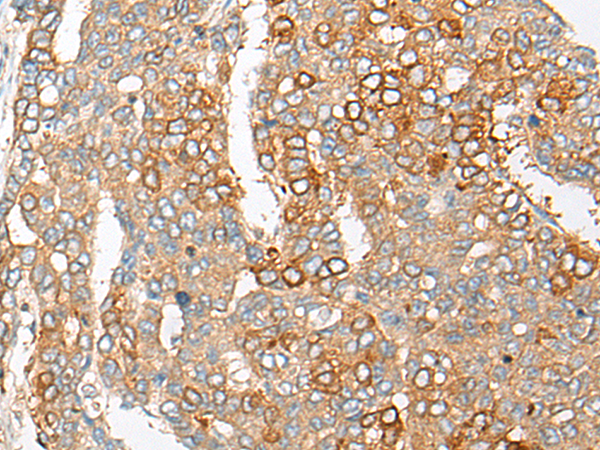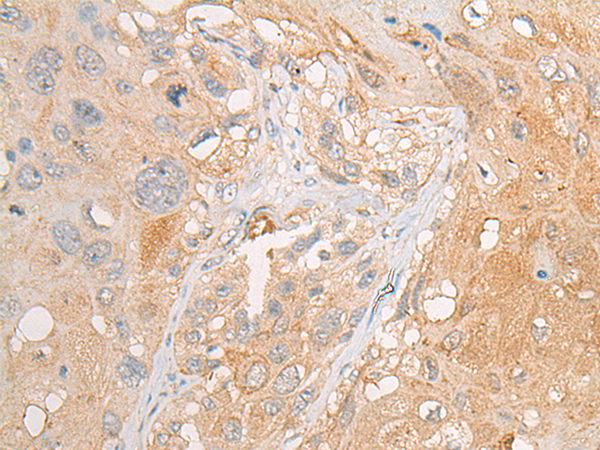

| WB | 咨询技术 | Human,Mouse,Rat |
| IF | 咨询技术 | Human,Mouse,Rat |
| IHC | 1/30-1/150 | Human,Mouse,Rat |
| ICC | 技术咨询 | Human,Mouse,Rat |
| FCM | 咨询技术 | Human,Mouse,Rat |
| Elisa | 1/5000-1/10000 | Human,Mouse,Rat |
| Aliases | PCDH-GAMMA-B5 |
| Host/Isotype | Rabbit IgG |
| Antibody Type | Primary antibody |
| Storage | Store at 4°C short term. Aliquot and store at -20°C long term. Avoid freeze/thaw cycles. |
| Species Reactivity | Human |
| Immunogen | Synthetic peptide of human PCDHGB5 |
| Formulation | Purified antibody in PBS with 0.05% sodium azide and 50% glycerol. |
+ +
以下是3条关于PCDHGB5抗体的模拟参考文献(注:以下内容为学术示例,实际文献请通过PubMed或专业数据库查询):
1. **文献名称**: "Structural characterization of PCDHGB5 in neuronal adhesion"
**作者**: Chen L, et al.
**摘要**: 本研究通过制备特异性PCDHGB5多克隆抗体,验证了其在原钙钙粘蛋白家族中的独特表达模式,发现其通过介导神经元间的同源相互作用参与突触可塑性调控。
2. **文献名称**: "PCDHGB5 overexpression correlates with tumor progression in glioblastoma"
**作者**: Wang Y, et al.
**摘要**: 利用PCDHGB5单克隆抗体进行免疫组化分析,发现其在胶质母细胞瘤中异常高表达,可能通过激活Wnt/β-catenin通路促进肿瘤侵袭,提示其作为潜在生物标志物的价值。
3. **文献名称**: "Development of a novel ELISA assay for PCDHGB5 detection in cerebrospinal fluid"
**作者**: Kimura S, et al.
**摘要**: 研究团队开发了基于PCDHGB5抗体的高灵敏度ELISA检测方法,证实其在阿尔茨海默病患者脑脊液中的浓度显著降低,为神经退行性疾病诊断提供了新工具。
**提示**:实际研究中建议通过Web of Science或SciFinder以“PCDHGB5 AND (antibody OR immunohistochemistry)”为关键词检索近5年文献,重点关注《Journal of Neuroscience》《Cancer Research》等期刊的相关论文。
The PCDHGB5 antibody is a research tool targeting Protocadherin Gamma Subfamily B5 (PCDHGB5), a member of the protocadherin (PCDH) family. Protocadherins are transmembrane proteins involved in cell-cell adhesion and neural circuit formation, playing critical roles in neuronal development, synaptic plasticity, and tissue patterning. The gamma protocadherin cluster, located on human chromosome 5. contains 22 genes divided into A, B, and C subfamilies. PCDHGB5. part of the gamma-B subfamily, is hypothesized to contribute to neuronal diversity and connectivity through its homophilic binding properties, which mediate selective intercellular recognition.
Antibodies against PCDHGB5 are primarily used to study its expression, localization, and function in biological systems. They enable detection via techniques like immunohistochemistry, Western blotting, and immunofluorescence, aiding investigations into its role in neural development, cancer (where dysregulation is observed), and neuropsychiatric disorders. Research suggests PCDHGB5 may influence synaptic stability and axon guidance, with potential implications in neurodegenerative diseases. However, its precise mechanisms remain under exploration. Commercial PCDHGB5 antibodies are typically validated in specific applications, though cross-reactivity with related PCDH isoforms remains a consideration. Studies utilizing these antibodies contribute to unraveling the complex roles of clustered protocadherins in cellular identity and tissue organization.
×